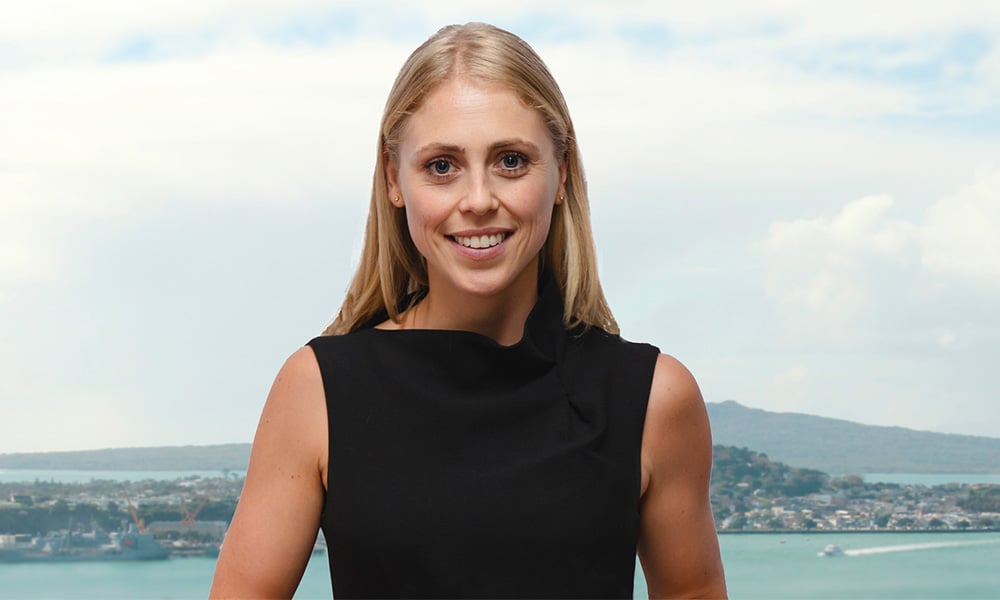
Alix Boberg credits Dame Sian Elias for taking a chance on her – and with bringing her back to NZ

As a student of both law and finance, 2014 Fulbright awardee Alix Boberg could also have been a banker. Nonetheless, her career path was eventually decided by none other than former Supreme Court Chief Justice Dame Sian Elias, who took her on as a clerk. After clerking at the Supreme Court for two years, Boberg “didn’t look back.”
Following a stint with Meredith Connell, she went on to gain experience as a criminal and regulatory defence lawyer in New York and London, before a visit from Dame Elias inspired Boberg to return to New Zealand. Today, she is a senior associate in Bell Gully’s litigation department.
In this interview, Boberg talks Bell Gully’s wellbeing initiatives, addressing stress as a focus of the legal industry, the shift towards innovative legal business models and her love of “boats, beaches and bush trails.”
What made you choose a career in law?
I studied both law and finance at Auckland University, and it was a close run thing between a career as a lawyer or a banker. However, in my final year of law school, I interviewed for a role clerking for then-Chief Justice Dame Sian Elias. She took a chance on me, and after two years clerking at the Supreme Court, I didn’t look back – drawing on that experience of appellate advocacy to work first as a Crown prosecutor at Meredith Connell, and later conducting criminal and regulatory defence in New York and London.
In a visit to London, Dame Sian encouraged me to return to New Zealand and contribute to our legal profession, and here I am, back in private practice at Bell Gully.
What do you love most about your job?
The variety. In any week, I might be investigating misconduct, responding to regulatory enquiries, advising a general counsel on risks, or advocating for a client before a regulator or a judge. The problems thrown at you by clients are always different – and interesting.
What is going on at the firm? Are there any new programs and initiatives that you’re particularly interested in?
There’s a lot going on! Bell Gully has had a really busy year supporting clients through the challenges of COVID-19. In recognition of that, there’s been a re-emphasis on wellbeing. The firm celebrated wellbeing week in October, and has recently expanded its wellbeing programme by establishing wellbeing committees that focus on all aspects of hauora.
On a personal level, I am really supportive of Bell Gully’s Kaiārahi programme, which sets up mentoring relationships between solicitors that are closer in experience to form more relatable pairings. Individuals can engage in conversations where they discuss successes, challenges and personal development openly, in a supportive setting.
What’s the biggest lesson you learned in the past year and what advice can you give fellow lawyers about it?
The past year has been one of huge change, challenge and uncertainty. No one has been unaffected. Personally, I’ve become a parent, relocated (accidentally) around the world, and moved jobs – change enough without the backdrop of a pandemic. It’s been joyful, but also stressful. I’ve learned to seek support from my family and close friends, and also to seek out nature, whether the local beach, bush or just the backyard. Addressing stress has become a real focus of the legal industry – connection and calm can provide an antidote.
What should the profession and law firms focus more on?
Technology. So much innovation and efficiencies can be achieved for clients by using digital solutions, whether that’s the automation of legal processes or machine learning in large document review or due diligence exercises. The legal profession lags behind most other industries in its uptake of technology – driven perhaps by the billable hour as a metric for value to clients. Yet the landscape is shifting, and quickly, towards legal business models that combine innovation and expertise to deliver value for clients.
Technology does not replace the sage, experienced counsel of a trusted lawyer. But it can assist any lawyer to process information and deliver advice more effectively and efficiently.
What challenges are particularly pressing in the country’s legal industry?
The major challenge of 2020 is helping our clients to manage the impacts of COVID-19 across all aspects of their businesses. A big issue we’re advising on right now across big and small New Zealand companies is directors’ duties: how can boards ensure that they are acting in the company’s best interests and not trading recklessly in a volatile economic environment with significant public health concerns. This uncertain forecast is difficult to navigate, and made more challenging by the expiry of the COVID-19 regulatory relief in the Companies Act and recent case law that has found directors liable to pay substantial awards in liquidation.
What are you looking forward to the most in the coming year?
Exploring the Kiwi backyard over the summer. Having worked overseas for six years, I’m stoked to be back living by the sea and will be taking full advantage of boats, beaches and bush trails.